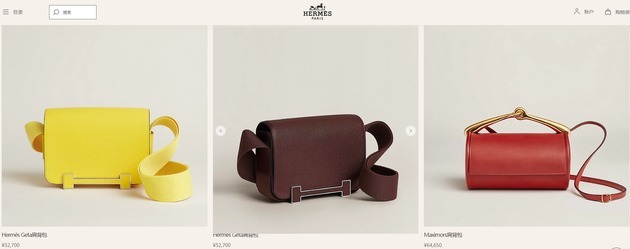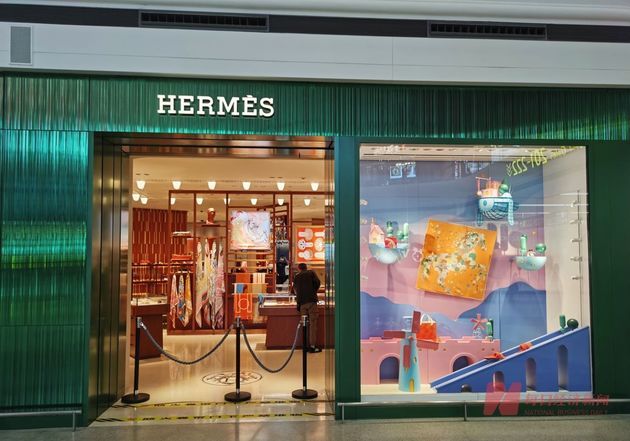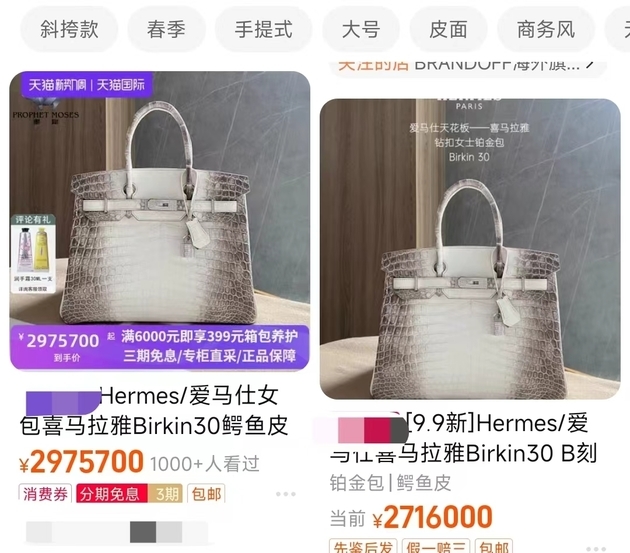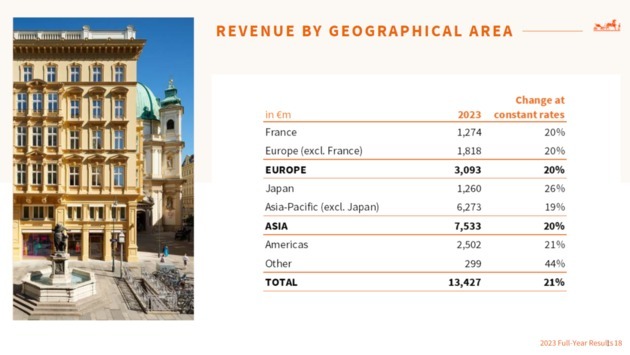On March 21st, the French luxury brand Hermès faced a class-action lawsuit in the United States over allegations of an “unwritten rule” for purchasing quotas. Local consumers believe that Hermès’ sales are “bundled” with the purchase of other products, violating U.S. laws.

Photo/Hermes
The incident quickly gained widespread attention. Reporters from NBD learned that Hermès’ “quota system” also exists in the Chinese market, with the current ratio ranging from 1:1.15 to 1:2. This means that to purchase a Hermès bag worth 100,000 yuan, one must first buy other Hermès products worth between 115,000 to 200,000 yuan. This has caused distress among many Chinese “Hermès enthusiasts,” with one consumer spending over 1.4 million yuan on quotas early this year, only to miss out on the desired bag for having a lower quota than others.
After spending over 1.4 million yuan without success, what exactly is Hermès’ quota rule? A reporter from the NBD, posing as a consumer, called Hermès, and the staff claimed, “We do not have such a practice as ‘quota.’”
As a top brand in the luxury industry, Hermès’ financial data is impressive. In 2023, Hermès’ recurring business income reached 5.65 billion euros, a 20% increase from the previous year. Whether the “quota system” contributed to this success is uncertain. This “class-action lawsuit” has also sparked public interest in the sales models of the luxury goods industry. Whether Hermès will continue this strategy or adjust it to appease consumer dissatisfaction remains to be seen.
Fed up with the quota system, American “socialites” have sued Hermès
Recently, two U.S. consumers filed a class-action lawsuit against Hermès. The plaintiffs accuse Hermès of bundling the sale of Birkin bags with other apparel and accessories, which violates U.S. laws.
Reporters from National Business Daily, after reviewing the lawsuit documents, found that the plaintiffs claim consumers cannot simply walk into a Hermès retail store and choose a Birkin bag. Typically, only those deemed eligible to buy a Birkin bag are shown the product in a VIP private room. The choice of which Birkin bag to buy, including style, size, color, and leather type, is not up to the consumer.
“Hermès salespeople only offer Birkin bags to those with a sufficient purchase history,” the lawsuit documents reveal. In other words, to qualify for the purchase of a Birkin bag, consumers must first buy enough of Hermès’ “auxiliary products.” The plaintiffs believe that Hermès salespeople are paid by the hour and can earn commissions based on sales volume. “The commission rate for salespeople varies depending on the type of product sold—3% for Hermès shoes, scarves, jewelry, and home goods; 1.5% for Hermès handbags other than Birkin bags; and no commission for selling Birkin bags.”

File Photo/Kong Zesi (NBD)
In order to obtain the "admission ticket" to buy a Birkin bag, the plaintiff in the above case spent tens of thousands of dollars on Hermes "auxiliary products." "Because she was told that 'special bags' would be provided to 'customers who have always supported our business,'" the plaintiff understood that she would need to spend more on auxiliary products in order to buy a Hermes Birkin bag. As a result, she bought a lot of accessories, but she was still unable to obtain the right to buy a Birkin bag.
Similarly, there have been similar incidents in China. In January of this year, according to a CCTV report, Ms. Du, a consumer from Ningbo, Zhejiang Province, said that she wanted to buy a bag at the local Hermes store, but the clerk said that she had to "buy some other goods" first. To this end, Ms. Du spent more than 1.4 million yuan to buy a number of Hermes brand products, including necklaces, cups, plates, clothes, and belts, but the clerk still claimed that there was "no stock" and refused to sell her the bag she wanted. "Ms. Du said that after she finished buying, the store manager said, 'I won't give you the bag. What can you do to me?'"
Hermes denied the practice of "matching goods." On March 21, NBD called the phone number on the Hermes website, and the staff member who answered the call said: "We do not have the saying of 'matching goods'. As long as the product has salable inventory in the store, you can purchase it normally."
Not only Quota, Relationship with Sales Associates Matter
In an interview with NBD, several consumers expressed their frustration with Hermès’ “hidden rule” of “complementary purchases.” To buy a classic bag, customers are often required to first spend a certain amount on other items. “The Birkin bag definitely requires complementary purchases, the Herbag does not. and the ‘basket’ used to be exempt but now it’s also subject to this rule,” said Xiao Xiao (a pseudonym).
Xiao Xiao, eager to purchase her desired Birkin bag, ended up buying many expensive, miscellaneous items from the sales associates, such as Hermès cups and blankets. Due to the scarcity and limited production of the Birkin, the more a sales associate sells, the greater their allocation of popular Hermès bags.
The exact amount required for complementary purchases is a guessing game. Broadcaster Guo Huini complained on social media, “The sales associates won’t tell you how much you need to buy, just keeps saying ‘a little more, a little more.’ I’ve already bought products worth 1.5 times the price of the bag, and she’s still asking me to buy more… It’s become a contest of who can throw more money. A friend of mine spent two million yuan in a few months for a bag worth several hundred thousand, but never even saw it.”
“Besides making complementary purchases, you also need to maintain a good relationship with your sales associates. It’s best to have a personal connection, sometimes dining together, and occasionally giving small gifts,” Xiao Xiao added.
Many consumers, including Guo Huini and Xiao Xiao, who are long-time customers of Hermès, find the complementary purchase system to be a crazy and tedious game. “It’s really annoying. It’s already such a hassle to buy a regular leather Birkin, let alone one made of rare leather. You spend the money and then wait forever,” Xiao Xiao said. “At first, when you’re in that circle and everyone else has one, you think you need one too. And indeed, the Birkin bag holds its value well, but eventually, you wonder if it’s worth it. It’s just a bag, right?”

Photo/Birkin on secondhand platform
Luxury goods expert Zhou Ting told NBD, “It’s normal for consumers to despise the‘complementary purchase system.’I even think there should have been lawsuits by now. Consumers should be respected, and must be respected. Complementary purchases are the greatest disrespect to consumers.”
Why Does the Hermes "Complementary Purchase" System Still Exist Despite Consumer Complaints?
Hermes' "complementary purchase" system has been controversy for years, with many consumers complaining about the unfair and discriminatory practice. Yet, the system continues to exist. So why?
A person from the consumption industry told NBD one reason is that the "complementary purchase" system helps Hermes to maintain its brand image as a luxury brand. By creating a sense of exclusivity and scarcity, Hermes is able to position itself as a brand that is only accessible to a selected few. This, in turn, increases the perceived value of Hermes products and makes them more desirable to consumers.
Another reason for the continued existence of the "matching goods" system is that it is profitable for Hermes. By requiring consumers to purchase other products in order to buy a Birkin bag, Hermes is able to generate more sales and boost its profits.
Finally, the "matching goods" system also helps Hermes to manage demand for its products. By limiting the number of Birkin bags that are available, Hermes is able to prevent oversupply and keep prices high.
In recent years, there have been a number of lawsuits filed against Hermes alleging that the "matching goods" system is illegal. However, these lawsuits have been unsuccessful. This is because Hermes has been able to argue that the system is not discriminatory and that it is simply a way of managing demand for its products.
Despite the controversy, the "matching goods" system is likely to continue to exist for the foreseeable future. It is a system that benefits Hermes in a number of ways, and it is unlikely that the company will change it anytime soon.
Lawyer: Proving Evidence in "Complementary Purchase" is Challenging
After searching for “Hermès allocation” on a social media platform, reporters found over 390,000 posts. These Hermès consumers call themselves “horse breeders.”
“In our country, there are two types of Hermès buyers. One is the truly wealthy, who have absolute financial freedom. They believe they should consume Hermès products. Giving Hermès as gifts is necessary to match their status. These people are the main consumers of Hermès, accounting for over 90% of its sales. The other type wants to be seen as having status and position, using Hermès to label themselves. These are supplementary contributors to Hermès’ sales,” Zhou Ting told NBD. The consumption power of Hermès’ core customers is gradually increasing, contributing more and more to luxury goods consumption.
Data from Yaok Institute shows that 0.3% of China’s high-net-worth individuals contribute over 82% of luxury goods consumption, which is steadily increasing.

Photo/Hermas website
To “breed horses,” one must continuously spend money to “feed the horse.” The strength of China’s “horse breeders” is not to be underestimated. Hermès’ financial report shows that in the fiscal year 2023, the Asian region (led by the Chinese market) continued to experience strong growth, with sales increasing by 19% at a fixed exchange rate, and all countries in the region saw significant sales growth.

Photo/Hermas 2023 financial report
“In 2023, three new Hermès stores were opened in Tianjin, Chengdu, and Wuxi,” said a Hermès staff member. As of now, Hermès has opened a total of 33 stores in mainland China.
Chinese “horse breeders” have also gained high favor from Hermès. At the 2023 fiscal year analyst meeting, Hermès CEO (the sixth-generation family heir) Axel Dumas mentioned that Chinese customers have a fascination with Hermès.
Chinese consumers, who have a love-hate relationship with Hermès, have many complaints about the “allocation rules” but so far have only expressed their dissatisfaction verbally. “In the legal document database, there are no cases found in China where consumers have filed lawsuits against Hermès or other brands for ‘allocation,’” said Fu Zhongwen, a senior partner at the Shanghai branch of Beijing Longan Law Firm, in an interview with the Daily Economic News.
When discussing the “allocation” behavior of luxury goods in the market, Pang Rui told NBD, “Since ‘allocation’ never involves a written contract, it’s not easy for consumers to prove their rights violations. Even if it can’t be proven as deception, this type of sales behavior sufficiently demonstrates the psychological advantage and brand attitude.”
Legally, it’s also difficult to determine whether the consumption rules requiring “allocation” to purchase specific luxury goods are illegal. Fu Zhongwen stated, “In practice, it’s relatively difficult for consumers to prove bundling sales practices.”
As the incident unfolds, whether Hermès will adjust its sales strategy has become a focal point. Regarding this, Pang Rui believes that the “allocation” situation of brands like Hermès has existed for many years, indicating that luxury goods have successfully navigated the current supply-demand relationship, brand premium, and legal regulations. “Whether ‘allocation’ will continue in the future depends on the strength and fluctuations of these variables.”


 川公网安备 51019002001991号
川公网安备 51019002001991号





